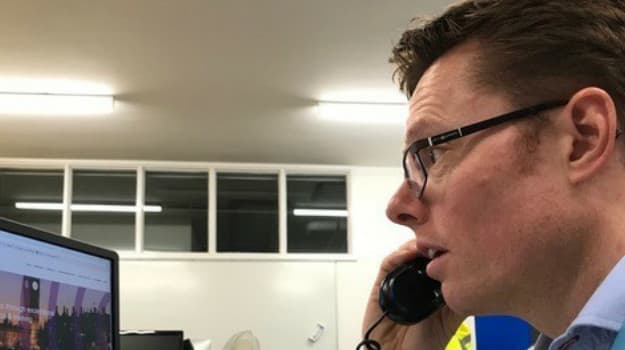
I left school at 16 and spent 10 years at NatWest Bank in customer-facing, retail banking before a job came up at head office in a sales support position. Part of my role was writing meeting notes and when I made them more readable and interesting, word got out I could write! This led to a comms /PR role in corporate banking. I then moved into the not-for-profit housing sector as communications manager responsible for comms – and PR – so I rather fell on the PR side. I’m a member of the Chartered Institute of Public Relations and have had focused PR roles for the past 15 years.
My first job as a NatWest counter clerk was a good introduction to the great British public and I’ve carried the interpersonal skills I gained then through my career. My customers are now journalists and our colleges, but I still have to build good relationships with people and help them achieve their goals.
Handling all press work for the group, the training arm (Capital City College Training) and two of the three colleges, plus all social media channels Twitter, Facebook and Instagram.
I see education as a great leveller. The FE sector does an amazing job in taking huge numbers of young people from school and giving them another chance to level the playing field, whether it's finding a route to university, an apprenticeship or an opportunity to learn the skills they need to get a job.
First thing I do in the morning is to check my emails to see if anything urgent needs doing, I scan publications like the TES and general news media websites for stories breaking in post-16 education and apprenticeships, etc, checking if we can comment on any issue. I may have meetings about future events or preparing for open days. I talk to my PR/comms officer about social media and what interesting posts we can upload that day. We also have to react to what is happening so, for instance, this morning I posted a short item saying snow is expected later on our Twitter and Facebook feeds. It's a mix of sharing good stories from across the group and posting content on our own and the other college sites plus providing news updates.
Five top chefs, who learned their trade at Westminster Kingsway college, are taking over the college restaurant for a week and I’m sending out releases to people like Time Out and the Evening Standard to promote it. The college’s catering school is one of the UK’s best – each year dozens of graduates join Michelin-starred restaurants and hotels across the globe (our alumni include Jamie Oliver and Ainsley Harriot). At the last count, 40 Michelin-starred chefs were linked to the college and a fair bit of my time is spent helping promote the catering school’s activities.
Last week I worked on a comment piece from the MD of our training arm which then appeared in TES, calling for more providers and businesses to do more to increase apprenticeship numbers.
Loads! For example, our culinary school was commissioned by Westminster City Council to create a large Christmas cake to celebrate the 75th anniversary of the Trafalgar Square Christmas tree. We got BBC London Live to interview staff, and film the cake, and it made the evening news.
The sheer size of the group – three colleges, a separate apprenticeship training arm and the group itself – presents some challenges. Each college has its own identity and specialisms and together cater for some 30,000 students. Of course, staff are flat out doing their day job teaching students, so talking to a journalist or posting information online is not a priority. So my job includes encouraging them to shout about themselves – something many people don’t do naturally.
Persistence, enthusiasm and the energy to keep going. You have to constantly think about interesting angles to pitch to a journalist, or how best to share it on social media. You have to hit the phones, talk to people, cultivate those relationships and then offer them good material. If people don’t get back to you, chase them up and be a bit of a pest because, if nothing else, it starts a dialogue with that journalist.
I have no formal PR qualification but this has not hampered my career. What counts is an ability to write coherently and engagingly and pull out nuggets of information that will interest a journalist – it really comes with practice. To young PR hopefuls, I’d say that you can't beat work experience even if only at a very junior level in a communications team or PR agency. While qualifications are important, lack of them wouldn’t stop me hiring someone: I’d always value experience over a PR or media degree. Besides, you can always study in your own time once you have a job – and often employers will cover training costs as happened in my case. I gained a professional postgrad diploma in marketing 12 years ago to gain Chartered Institute of Marketing membership – it was two nights a week, three hours a night over three years. And also don’t forget the new apprenticeship opportunities starting to appear.
The thought of doing a good job, serving my customers and ultimately getting students into our colleges and learning in an environment where they can do what they need to succeed in life.
Are you thinking of pursuing a career in PR, marketing or communications? If so, have a look through our live vacancies and scout out the perfect role for you.
AoCJobs, part of the Association of Colleges, connects teachers and support staff with schools and colleges for online job opportunities.

